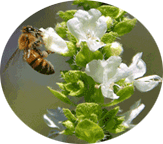Infused Oils
Revised March 4, 2012 to remove olive, nut and seed oils, and to add unrefined coconut oil.
It’s easy to make herb, spice, garlic, onion and hot pepper infused oils at home.
Choice of Oil
Only use unrefined extra virgin coconut oil that is unbleached, and not deodorized or hydrogenated.
Coconut oil is highly resistant to spoilage and has a long shelf life (2 years at room temperature), so it is not kept in the refrigerator.
Coconut oil is kept in the cupboard or on the kitchen counter. Like other saturated fats coconut oil goes solid when cooled below room temperature, and it is liquid at room temperature or above.
Choice of Herbs, Spices & Vegetables
It is best to use fresh herbs which have been thoroughly washed and dried, than to use spices already ground up. Always buy organic or certified organic spices because all commercial brands have been irradiated (zapped with radiation) which damages cells in the body when consumed.
Whole herbs or spices are preferred, i.e. whole cloves, whole nutmeg, and whole seeds, i.e. cardamom, star anise, etc.
Garlic, onions and hot peppers must always be raw and certified organic. Do not add too much hot pepper, unless you want to use it for medicinal purposes. You can use ground or flaked hot peppers that are certified organic.
Herb suggestions:
- basil
- bay leaf
- chervil
- chives
- cilantro
- dill
- marjoram
- mint
- oregano
- parsley
- rosemary
- summer savory
- tarragon
- thyme
Spice suggestions:
cardamom
- basil
- chives
- cloves
- coriander seeds
- dill
- juniper
- mint
- nutmeg
- rosemary
- star anise
- tarragon
Food suggestions:
- garlic
- hot pepper flakes
- jalapeno peppers & other hot peppers
- shallots
- onions
Instructions:
Whole cloves and seeds should be crushed by putting them in a strong plastic bag and crushing them with a hammer. Whole nutmeg needs to be grated. All herbs should be thoroughly washed and dried, and bruised to release their flavors. To bruise herbs, gently roll and rub a bunch of sprigs in your hand or tap loose leaves with a mallet or the back of a knife. Garlic, onion, and hot peppers should be crushed and chopped.
For every 1 cup of herb or spice (can be a mixture including garlic, onion or hot peppers) use 4 cups of oil. If you want to make 2 cups of oil use 1/2 cup of herb or spice. To make a very strong infusion use 1 cup of herb, spice or vegetable for every 1 cup of oil, or 1/2 cup for every 1/2 cup of oil:
- Warm the oil very slightly – only to the point that you can still put your finger in it. Warmed oil helps start the infusion process.
- Place chosen spice, herb, or food a clean glass container, cover with warmed oil, and sealed tightly.
- Leave the container for two weeks (14 days) in direct sunlight. If it gets cold it will become more solid.
- Every day turn the container upsidedown and rightsideup about 5 times, but do not shake it.
- At the end of 2 weeks taste the oil. If it is not strong enough, add more fresh herbs and let it stand another week, again turning the container every day.
For very strong infused oils do not remove the herb, spice or food. The longer it sits the stronger and more potent it will become.
You can use infused oils in sauces, stir-fried dishes, soups, salad dressings, and marinades.
You can either strain the oil or leave the herbs in it for salad dressings or marinades. If you do not strain the herbs, the flavor will become stronger as it stands, so keep that in mind.
You can add garlic or onion to herbed or spiced oils, but remove the garlic and onion after a couple of days if you do not want the flavor of the herbs to be overpowering, unless you prefer a strong infusion or strong taste.
